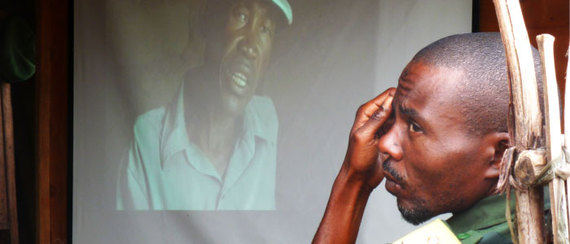By Lena Slachmuijlder
I remember the meetings well. Rape, pillage, murder, extortion... the list of heinous offenses committed by Congolese soldiers and police officers in eastern DR Congo seemed endless. At the end of each meeting, we -- the human rights activists, UN staffers and others from civil society organizations -- would decide to go, meet the soldiers, and tell them to, well, to stop.
It never worked.
Most of the time, the soldiers wouldn't show up. If they did they'd give a cursory nod and make empty promises.
They were convinced that they were the victims in this conflict. Not enough pay, not enough food, and now a bunch of civil society activists telling them what to do. They saw us as adversaries, not collaborators.
The DR Congo was facing the deadliest war since World War II. Representing Search for Common Ground, an international peacebuilding organization, I knew that lasting peace would never come if we couldn't change the way the soldiers were treating civilians.
Slowly, we began another type of conversation with them. One about enabling them to become protectors, not perpetrators. We listened, and heard that deep down, they also wanted to change. They knew that if the communities didn't trust them, feared them, that their own security was in danger. And they weren't proud of their record of abuses.
As we designed our initiative, we needed to put their needs at the center. We created educational tools to resonate with the soldiers' sense of self-esteem. That was six years ago. Since then, Search for Common Ground has engaged with more than 40,000 Congolese soldiers of all ranks across the country. They're trained, coached and equipped with interactive training materials to use within their own brigades and battalions. They educate other soldiers using radio drama, comic books, film screenings and participatory theatre. The soldiers also reach out to the communities where they're deployed to organize town hall meetings, community clean-ups and sports events. Their goal is zero tolerance in their units.
The soldiers feel that this initiative is about them, not against them. Communities where these soldiers have been deployed say they feel safer.
Take Henri Bukasa, a Captain who had been through the worst of DR Congo's many wars. "I developed a lot of anger because of war," he says. "Later, I realized this was due to my own ignorance. Now it's me who is teaching other soldiers about preventing rape. We need to give everyone a chance." Watch Henri's story here.
We're wrong when we think that change is about the good people telling the bad people to stop being bad. No one was born a killer, a rapist, a terrorist. It's so simple, and yet we forget.
Change doesn't happen by telling people that they're wrong. It happens by inspiring people to find a place of strength, dignity and power by building peace. This is even truer in communities where people have found that sense of strength by using violence.
Transformation is when someone who used to be comfortable with violence chooses peace - not because he's afraid of 'getting caught', but because that's not what 'he's about'.
Like Suman Noka, the Nepali youth activist who has lived through countless clashes with the police. He had little good to say about the Nepali police until Search for Common Ground's team in Nepal brought Suman and other youth together with the police to talk, learn, and play football. "From now on, we won't look at them 'that way'. We'll try and coordinate with them." Watch Suman's story here.
We know that around the world, young people like Suman can choose violence, or choose peace. And they'll only choose peace if it makes them feel strong, respected and influential.
Like Janet Wasinda, from Jos, in northern Nigeria. Before she was 10 years old she saw her friends die because of the violence. She was told it was because of people from the 'other' religion. Full of anger and fear, how might she have reacted if someone encouraged her to seek revenge?
When Janet attended Search for Common Ground's Naija Girls Camp, she shared a room with a girl of that 'hated' religion. At first she was afraid. But by the end, Janet says "I realize we are all just the same. That fear of being killed? It's gone." When Janet went home, she told her family and neighbors that she no longer wanted to be on one side of the divide. She wanted to bridge it. Watch Janet's story here.
They say that peace isn't a noun, it's a verb. It's about a way to be, with ourselves and with others. It's about new relationships. John Lennon once said, "Peace is not something you wish for. It's something you make, something you do, something you are and something you give away."
Lena Slachmuijlder is the Vice President of Programs for the international peacebuilding organization Search for Common Ground.
